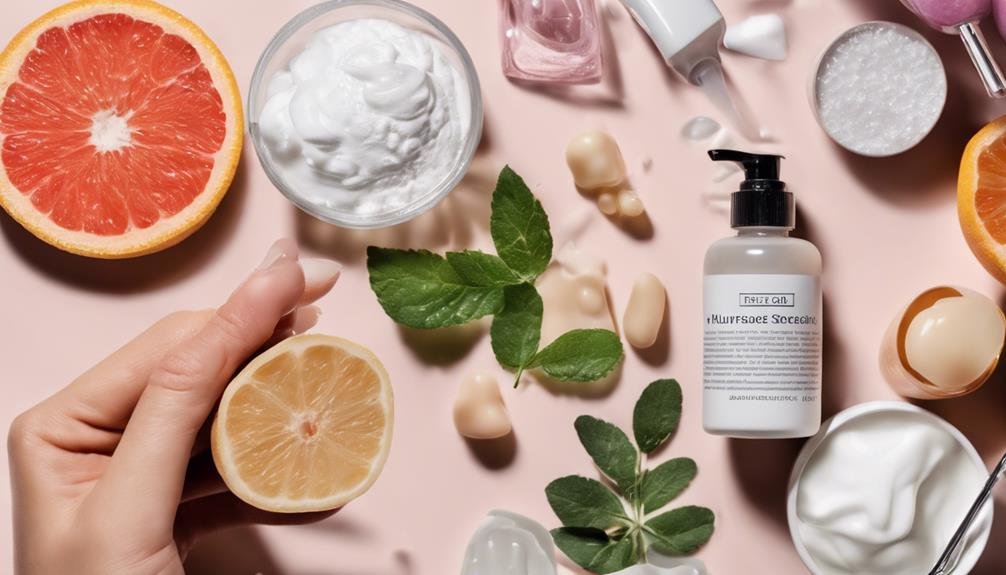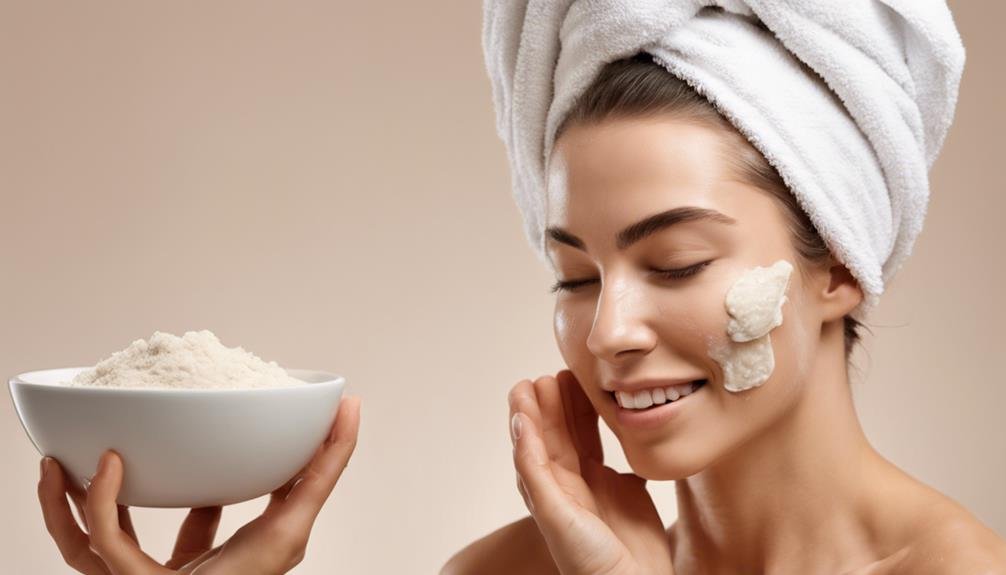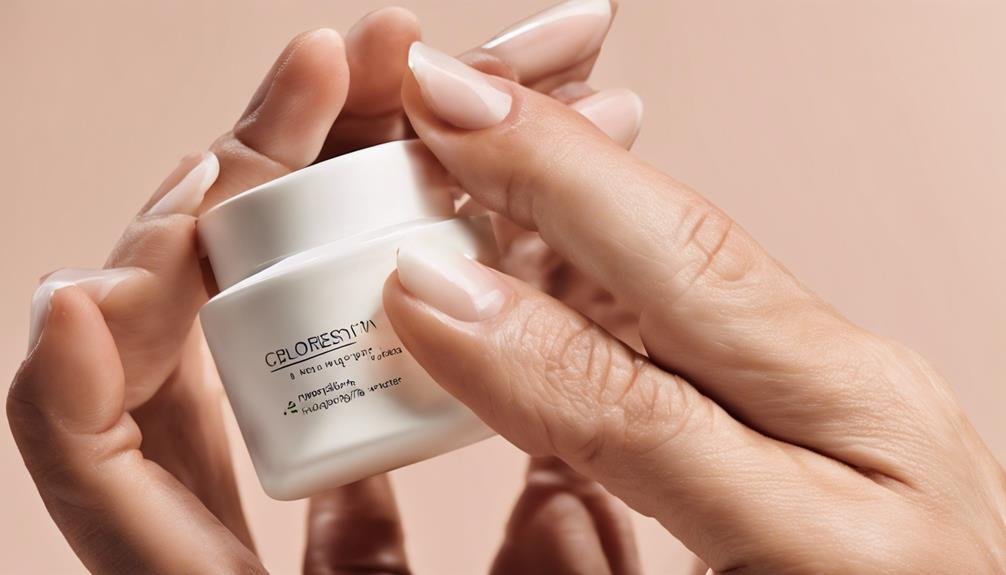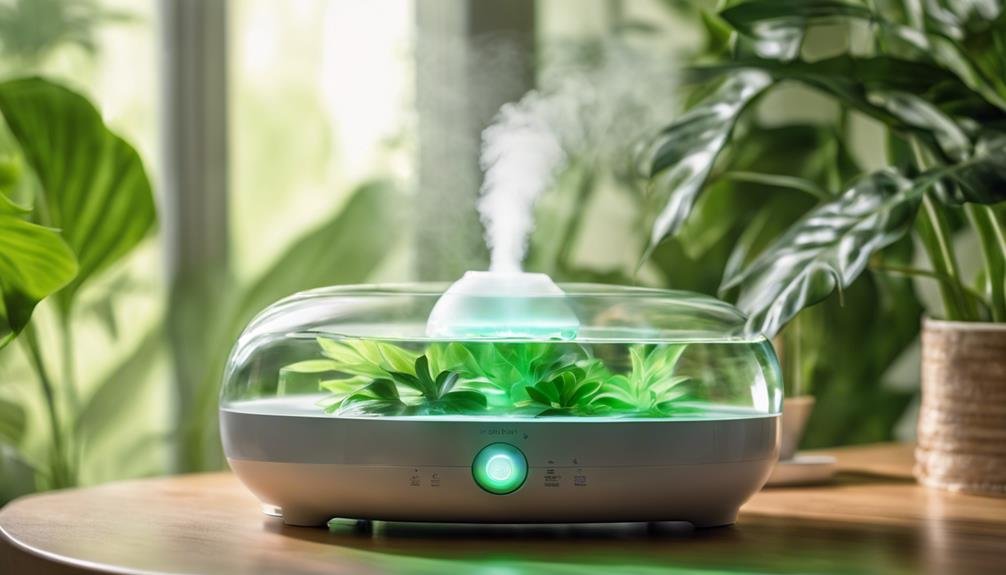To maintain well-hydrated skin, you must understand the importance of hydration and how it impacts your skin health. By incorporating the right moisturizer with key ingredients, you can effectively lock in moisture and strengthen your skin's natural barrier. Furthermore, establishing a consistent skincare routine, both in the morning and at night, is crucial for optimal skin hydration. But there's more to it than just skincare products; there are additional factors that can significantly impact your skin's moisture levels.
Key Takeaways
- Hydrate internally with water and herbal teas.
- Use moisturizers with hyaluronic acid and ceramides.
- Protect skin barrier with SPF and gentle cleansers.
- Consider a humidifier for added moisture.
- Avoid harsh ingredients like alcohol and fragrances.
Importance of Hydration
Ensuring proper hydration for your skin is essential for maintaining its health and appearance. Your skin is the largest organ in your body and acts as a protective barrier against external elements. When your skin lacks hydration, it can become dry, tight, and prone to irritation. Dehydrated skin is also more susceptible to premature aging, as adequate moisture helps maintain its elasticity and suppleness.
Hydration is crucial because it supports the skin's natural functions, such as regulating temperature and preventing excessive water loss. Water is vital for cell turnover and repair processes, which are essential for maintaining a healthy complexion. Additionally, well-hydrated skin is more effective at combating environmental stressors and pollutants that can damage its structure.
To keep your skin adequately hydrated, it's important to drink plenty of water throughout the day and use hydrating skincare products. Moisturizers containing ingredients like hyaluronic acid, glycerin, and ceramides can help lock in moisture and support your skin's barrier function.
Choosing the Right Moisturizer
When selecting a moisturizer for your skin, it's crucial to consider factors such as your skin type, specific concerns, and ingredient preferences. Different skin types require different formulations to effectively lock in moisture. If you have oily skin, opt for lightweight, non-comedogenic formulas to prevent clogged pores. Dry skin benefits from richer, creamier textures that provide intense hydration. Combination skin may require a balanced approach, using different moisturizers for different areas of the face.
Consider any specific skin concerns you may have, such as acne, aging, or sensitivity. Look for moisturizers that address these issues, whether it's through added ingredients like hyaluronic acid for plumping and firming, niacinamide for calming and brightening, or ceramides for strengthening the skin barrier.
Lastly, pay attention to ingredient preferences. Some individuals may prefer natural ingredients like aloe vera or shea butter, while others may opt for scientifically-backed compounds like peptides or retinol. Choose a moisturizer that aligns with your values and meets your skin's needs for optimal hydration and care.
Hydrating Ingredients to Look For
To effectively hydrate and nourish your skin, it's essential to look for specific ingredients in your moisturizers. When selecting your skincare products, keep an eye out for these key hydrating ingredients:
- Hyaluronic Acid: This powerful humectant attracts water to the skin, helping it stay plump and hydrated. It can hold up to 1000 times its weight in water, making it a fantastic ingredient for boosting skin moisture levels.
- Glycerin: Known for its ability to draw moisture into the skin, glycerin is a popular ingredient in moisturizers. It helps maintain the skin's water balance, leaving it feeling soft and smooth.
- Ceramides: These lipids are essential for maintaining the skin's barrier function, preventing moisture loss and protecting it from external aggressors. Including ceramides in your moisturizer can help strengthen your skin's natural protective barrier.
Morning Skincare Routine
Starting your day with a well-crafted morning skincare routine sets the tone for healthy, radiant skin throughout the day. A good morning routine should focus on cleansing, moisturizing, and protecting your skin from environmental stressors. Here is a simple yet effective morning skincare routine to help you start your day right:
| Step | Product | Purpose |
|---|---|---|
| 1. Cleanse | Gentle Face Wash | Remove impurities and excess oil |
| 2. Tone | Hydrating Toner | Restore skin's pH balance |
| 3. Moisturize | Lightweight Moisturizer | Hydrate and nourish the skin |
| 4. Protect | SPF Sunscreen | Shield against UV rays and pollution |
| 5. Eye Care | Eye Cream | Hydrate and reduce puffiness |
Nighttime Skincare Routine
Nighttime is the perfect opportunity to repair and rejuvenate your skin after a long day of exposure to various environmental stressors. Ensuring a proper nighttime skincare routine can help your skin recover and prepare for the following day. Here are some essential steps to include in your nighttime skincare regimen:
- Gentle Cleansing: Start by removing makeup, dirt, and impurities with a mild cleanser to prevent clogged pores and breakouts.
- Hydrating Serums: Apply a hydrating serum containing ingredients like hyaluronic acid or vitamin C to nourish and repair your skin while you sleep.
- Moisturize: Finish off with a rich, moisturizing night cream to lock in hydration and promote skin renewal throughout the night.
Hydrating Face Masks
Rejuvenate your skin with hydrating face masks that provide a powerful boost of moisture and nourishment. These masks are a luxurious addition to your skincare routine, offering intense hydration to combat dryness and revitalize your complexion.
Packed with potent ingredients like hyaluronic acid, glycerin, and vitamins, hydrating face masks work wonders in restoring your skin's natural moisture balance.
When choosing a hydrating face mask, look for products that cater to your skin type and concerns. Whether you have dry, sensitive, or combination skin, there are masks formulated to address your specific needs.
Consider masks with soothing properties like aloe vera or chamomile for sensitive skin, while opting for richer formulas with shea butter or avocado oil for dry skin.
To maximize the benefits of hydrating face masks, apply them to clean skin and leave them on for the recommended time. The mask's ingredients penetrate deeply into your skin, delivering essential nutrients and moisture.
Incorporating hydrating face masks into your skincare regimen can leave your skin looking plump, radiant, and deeply moisturized.
Exfoliation for Better Absorption
For optimal skincare results, incorporating exfoliation into your routine can significantly enhance product absorption and efficacy. Exfoliation removes dead skin cells, allowing moisturizers to penetrate deeper and work more effectively.
Here are three key reasons why exfoliation is essential for better absorption:
- Unclogs Pores: Exfoliating regularly helps to unclog pores by getting rid of dirt, oil, and other impurities that can block the absorption of skincare products.
- Promotes Cell Turnover: By promoting cell turnover, exfoliation encourages the growth of new, healthy skin cells that are more receptive to hydration and nourishment.
- Enhances Blood Circulation: Exfoliation stimulates blood circulation, leading to better nutrient delivery to the skin and improved absorption of beneficial ingredients in your skincare products.
Internal Hydration Tips
To maintain optimal skin moisture levels, it's crucial to focus not only on external skincare but also on internal hydration. Drinking an adequate amount of water is essential for keeping your skin hydrated from the inside out. Water helps to flush out toxins, deliver nutrients to skin cells, and maintain the skin's elasticity. Aim to drink at least 8-10 glasses of water per day to support healthy skin hydration.
In addition to water, consuming foods rich in omega-3 fatty acids, such as salmon, walnuts, and flaxseeds, can help improve skin hydration and maintain a strong skin barrier. Omega-3 fatty acids help to lock in moisture and reduce inflammation, leaving your skin looking plump and radiant.
Limiting your intake of dehydrating beverages like alcohol and caffeine can also contribute to better skin hydration. These beverages can have a diuretic effect, leading to increased water loss and potential dehydration. Opt for hydrating beverages like herbal teas or infused water to support your skin's moisture levels from within. Remember, maintaining internal hydration is just as important as external skincare for achieving healthy, moisturized skin.
Protecting Your Skin Barrier
As you focus on maintaining optimal skin moisture levels through internal hydration, it's equally important to prioritize protecting your skin barrier. Your skin barrier acts as a shield, safeguarding against environmental stressors and locking in moisture. Here are three essential ways to protect your skin barrier:
- Gentle Cleansing: Opt for a mild, hydrating cleanser that won't strip your skin of its natural oils. Harsh cleansers can compromise your skin barrier, leading to dryness and irritation.
- Moisturize Regularly: Use a moisturizer with ingredients like ceramides, hyaluronic acid, and glycerin to support your skin barrier function. Keeping your skin hydrated strengthens its protective barrier.
- Sun Protection: UV rays can damage your skin barrier, so always apply a broad-spectrum sunscreen with at least SPF 30 daily. This helps prevent moisture loss and maintains the health of your skin barrier.
Avoiding Harsh Ingredients
Protecting your skin involves more than just what you put on it—it also means being mindful of what you avoid. To keep your skin moisturized and healthy, steer clear of harsh ingredients that can strip away moisture and irritate your skin. Ingredients like alcohol, fragrances, sulfates, and parabens can be drying and potentially harmful to your skin barrier.
Alcohol-based products can be particularly harsh, as they can strip away the natural oils that help keep your skin hydrated. Fragrances, often found in various skincare products, can cause irritation and sensitivity, especially for those with sensitive skin.
Sulfates are common in cleansers and can be too harsh, leading to dryness. Parabens, used as preservatives in many products, have been linked to skin irritation and other health concerns.
Opt for gentle, fragrance-free products with hydrating ingredients like hyaluronic acid, glycerin, and ceramides to maintain your skin's moisture barrier effectively. By avoiding harsh ingredients, you can help your skin stay moisturized, soft, and healthy.
Benefits of Humidifiers
For maintaining optimal skin hydration, incorporating a humidifier into your living or work space can offer numerous benefits. Humidifiers can significantly improve your skin health by adding moisture to the air, combating dryness, and enhancing your overall skincare routine.
Here are three key benefits of using a humidifier:
- Increased Hydration: Humidifiers help to increase the moisture levels in the air, preventing your skin from becoming dry and flaky. This added hydration can promote a supple and radiant complexion.
- Improved Skin Barrier Function: By maintaining adequate moisture levels in the air, humidifiers support your skin's natural barrier function. This can help protect your skin from external aggressors and reduce the risk of irritation and inflammation.
- Enhanced Absorption of Skincare Products: Proper humidity levels can aid in the better absorption of your skincare products, allowing them to penetrate the skin more effectively and deliver optimal results.
Incorporating a humidifier into your daily routine can be a simple yet effective way to boost your skin's hydration levels and overall health.
Professional Skincare Treatments
Professional skincare treatments play a pivotal role in maintaining and enhancing the health of your skin. These treatments are designed to address specific skin concerns and provide targeted solutions that may not be achievable with regular at-home skincare routines alone. Visiting a licensed esthetician or dermatologist for professional treatments can offer a deeper level of care and expertise, helping you achieve optimal skin health.
Common professional skincare treatments include facials, chemical peels, microdermabrasion, and laser therapy, among others. These treatments are tailored to your skin type and concerns, aiming to improve skin texture, tone, and overall appearance.
Professional treatments can help address issues like acne, hyperpigmentation, fine lines, and dehydration, providing visible results and long-term benefits for your skin.
When considering professional skincare treatments, it's essential to consult with a qualified skincare professional to determine the best options for your skin. They can assess your skin's specific needs and recommend treatments that align with your skincare goals, ensuring a personalized approach to achieving healthy, moisturized skin.
Frequently Asked Questions
Can Over-Hydrating Skin Lead to Breakouts?
Over-hydrating skin can potentially lead to breakouts as it may disrupt the skin's natural balance, causing excess oil production and clogged pores. It's important to find a moisturizer that suits your skin type to avoid this issue.
Should I Apply Moisturizer Before or After Sunscreen?
Before applying sunscreen, you should use moisturizer. This helps create a protective barrier and ensures your skin stays hydrated. Moisturizer acts as a shield against potential sunscreen irritation while keeping your skin nourished and healthy.
Can Using Too Much Moisturizer Clog Pores?
Using too much moisturizer can lead to clogged pores, especially if the product is heavy or comedogenic. It's essential to find a balance that keeps your skin hydrated without overwhelming it. Experiment to see what works best for you.
Is It Normal to Feel Tightness After Applying Moisturizer?
Yes, feeling tightness after applying moisturizer can occur due to various factors like dehydration or improper product selection. Consider switching to a more hydrating formula or adding a facial oil for extra moisture.
Can Certain Foods Affect Skin Hydration Levels?
Certain foods can impact skin hydration levels. Foods rich in omega-3 fatty acids, like salmon and flaxseeds, can help maintain skin moisture. Hydration-promoting foods include cucumbers and watermelon. Stay hydrated and nourished for healthy skin.
Conclusion
In conclusion, maintaining hydrated skin is crucial for its health and appearance. Did you know that up to 60% of the adult human body is water, emphasizing the importance of hydration for overall well-being? By following a consistent skincare routine, incorporating hydrating ingredients, and protecting your skin barrier, you can achieve and maintain moisturized, healthy skin. Remember, hydration is key for a radiant complexion.






